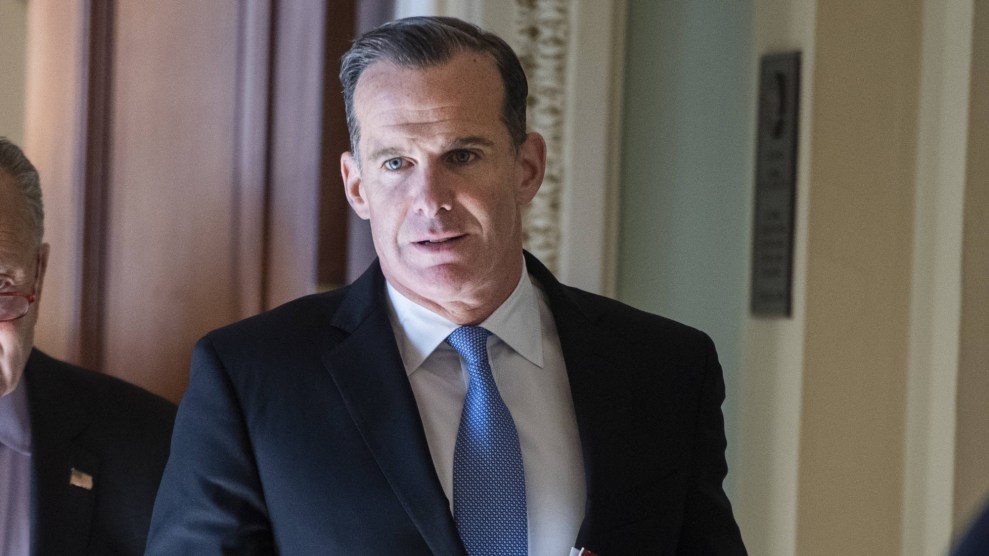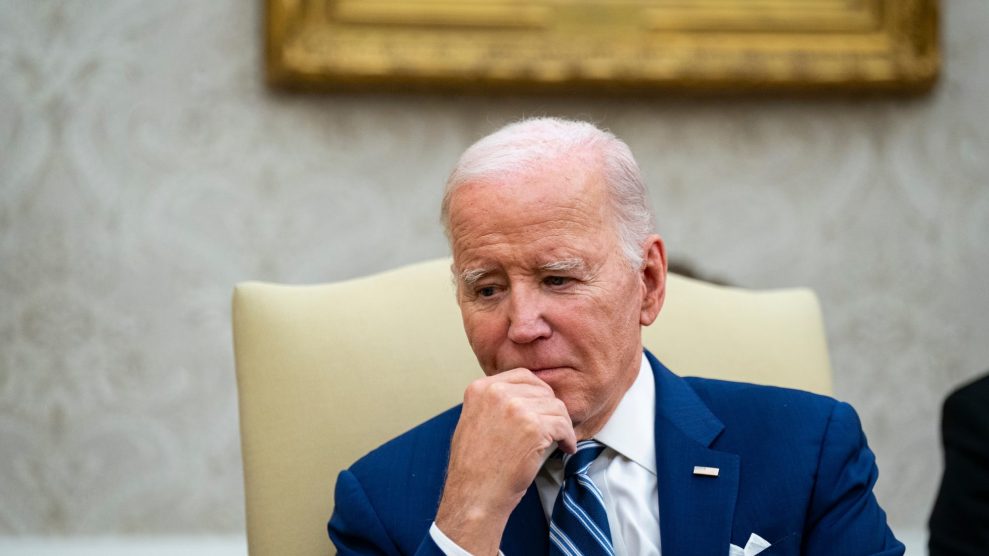
Brett McGurk in 2019.Tom Williams/CQ Roll Call/Zuma
At a summit in Bahrain on Saturday, a US official stated that far more humanitarian aid would be allowed into Gaza if Hamas released the hostages it is holding. In doing so, Brett McGurk, the White House Coordinator for the Middle East and North Africa, effectively conceded that Israel is subjecting the people of Gaza to collective punishment. Collective punishment is a war crime.
“A release of large numbers of hostages would result in a significant pause in fighting. A significant pause in fighting,” McGurk stated, “and a massive surge of humanitarian relief. Hundreds and hundreds of trucks on a sustained basis entering Gaza from Egypt.”
“This is the pathway to a pause in the fighting. The release of hostages,” McGurk added. “The onus here is on Hamas. This is the path. Simply calling for ceasefire is not a path to peace.”
Jeremy Konyndyk, president of Refugees International, argued that McGurk’s words violated the laws of armed conflict.
This is a hugely damaging and counterproductive position.
Contravenes multiple elements of the Laws of Armed Conflict.
Contradicts weeks of USG messaging about the imperative to aid Gaza's civilians.
Will be understood by the world as USG endorsing collective punishment. https://t.co/ElRIIom2dR
— Jeremy Konyndyk (@JeremyKonyndyk) November 18, 2023
Before McGurk’s remarks, Human Rights Watch and other groups had made clear that collective punishment is not permissible under international law. “The Israeli government is deliberately deepening the suffering of civilians in Gaza by refusing to restore the flow of water and electricity and blocking fuel shipments,” Human Rights Watch’s Sari Bashi wrote last month. “Willfully impeding relief supplies is a war crime, as is collectively punishing civilians for the actions of armed groups.” Bashi stressed that the war crimes committed against Israeli civilians on October 7 do not justify Israel committing war crimes of its own against the people of Gaza.
McGurk did not dwell on the idea that civilians in Gaza are being made to suffer until Hamas releases its hostages, or with the more than 11,000 Palestinians, including over 4,600 children, who have so far been killed during Israel’s assault on Gaza. But he did acknowledge some of the costs. “We are working to significantly increase assistance into Gaza. And everybody working on this feels the pain and the emotion that [the Jordan Foreign Minister] laid out,” McGurk said. “Everyone. Everyday. It is horrific. It is intolerable…and we are leading efforts to increase the flow of life-saving sustained humanitarian assistance.”
In keeping with a longstanding policy of President Joe Biden, McGurk explained the United States would keep its disagreements with Israel private. “We will not tell another country how to grieve or how to protect itself,” McGurk said. “But as friends and partners, we will do our best. And offer our best advice and counsel.”
McGurk has a long history inside the Washington national security establishment. After attending Columbia Law School, he clerked for the conservative Chief Justice William Rehnquist. He later worked in Iraq during the George W. Bush administration, and then served under both Barack Obama and Donald Trump. He is now one of the most influential advisers shaping Biden’s response to the war in Gaza.
A HuffPost profile last year presented McGurk as a polarizing figure. The article stated that McGurk’s reputation was best summarized by a remark a former official had once heard: “the most talented bureaucrat they’ve ever seen, with the worst foreign policy judgment they’ve ever seen.”
McGurk’s tone at Saturday’s summit presented a remarkable contrast with an earlier speech by Jordanian Minister of Foreign Affairs Ayman Safadi. “All of us have to speak loud and clear about the catastrophe that the Israeli war is brining not just on Gaza but on the region in general,” Safadi said, beginning his address. “This is not a time for mincing of words. This is a time to state facts as they are. This is not self-defense. This is a blatant aggression, the victims of which are innocent Palestinians.”
“The humanitarian catastrophe resulting from this is beyond words,” he continued. “People crowding UNRWA shelters have no access to food or water. We’re looking at the high possibility of a breakout of disease with no sanitation facilities, no medicine.”
Safadi said there was no justification for the killing of Israeli civilians on October 7, but made clear he believed Israel’s response had violated international law. “Civilians have a right to protection. Denial of food, medicine, fuel to Gazans is a war crime,” he explained. “We have to call it out as a war crime because it is. International law has to apply.”
About twenty minutes later, McGurk came to the same podium for his speech. “We have been working to get humanitarian aid into Gaza, increasingly,” McGurk stressed. “But the surge in humanitarian relief, the surge in fuel, the pause in fighting will come when hostages are released.”
McGurk acknowledged the need for more humanitarian assistance, while emphasizing the connection between Hamas releasing hostages and aid increasing. “There are now approximately 100 trucks a day entering Gaza loaded with assistance, but it is not enough,” he said. “Nobody says it’s enough. And we aim to double that amount as soon as possible, and then see it grow exponentially from there. But I want to just stress: The hostages are released, you will see a significant, significant change.”
McGurk repeated the Biden administration’s oft-stated position that Israel should follow international law. But he made no effort to explain how that charge was compatible with the support for collective punishment he detailed in his own speech.
















